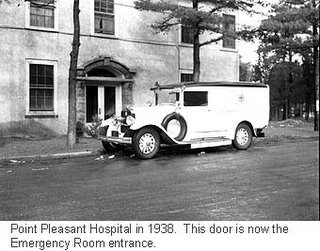 The solution? Eat more bananas and drink more orange juice. There are dietary supplements they can give me, too, but with my numbers not all that far out of whack, they think they can get things back into balance with some minor dietary changes.
The solution? Eat more bananas and drink more orange juice. There are dietary supplements they can give me, too, but with my numbers not all that far out of whack, they think they can get things back into balance with some minor dietary changes.This is just another reminder to me of how numbers-driven modern medicine is. My grandfather, Robert Abbe MacKenzie, was a pioneer obstetrician-gynecologist in Asbury Park, New Jersey, and delivered tens of thousands of babies in his time. He used to tell us how, while attending medical school at New York’s Columbia College of Physicians and Surgeons around 1917-1921, he learned how to make mustard plasters. He also learned how to diagnose the position of a baby in its mother’s womb by touch – nowadays most obstetricians wouldn’t know how to do that, because they depend on ultrasound scans. By the time my grandfather was 100 years old and receiving medical treatment himself, there must surely have been a lot that was mysterious to him about how his own doctor made treatment decisions.
I also remember hearing Arnie Lane, a longtime member of our church who was chief administrator of the old Point Pleasant Hospital for decades and lived into his mid-90s, tell of how he began his career in hospital administration. He was hired by a local doctor at the age of 18, while he was still in high school, to administer anesthesia during surgery. There wasn’t much more to it than squeezing a rubber bulb as the doctor instructed him, inflating the patient’s lungs with an air-and-ether mixture and maybe keeping his eye on a gauge or two. When the surgery was over, it was Arnie’s job to go out into the streets of Point Pleasant Beach with a couple of dollars, and hire four strong men to come carry the patient upstairs, from the former dining room of the converted house the doctor used as a hospital, into one of the upstairs bedrooms. It just goes to show how much medicine has changed in just over one human lifetime.
 (Actually, even the caption's now a historical artifact; the hospital building was sold and torn down recently.)
(Actually, even the caption's now a historical artifact; the hospital building was sold and torn down recently.)As for me, I’m glad someone’s been scrutinizing my blood-test results in order to let me know when my potassium’s down. It’s comforting to know that some perfect stranger is watching over me in that way. It’s also a little creepy: that something so intimately personal as my own blood chemistry is displayed on the computer monitor of some lab technician I’ve never met.
 So, I eat a banana this afternoon. Maybe I’ll have a glass of V-8 or orange juice before I go to bed tonight. I’ve got to keep covenant with those kind people who are watching over me.
So, I eat a banana this afternoon. Maybe I’ll have a glass of V-8 or orange juice before I go to bed tonight. I’ve got to keep covenant with those kind people who are watching over me.I’ll bet some of you thought, when you read the title of today’s entry, that it would be all about how God watches over us. Well, it is. I believe God uses all kinds of people, sometimes in ways we don’t even know, to insure that “all things work together for good for those who love God, who are called according to his purpose” (Romans 8:28). I like to think that God’s purpose is for me to survive this thing, to continue my ministry, to continue to be here as a husband and father and friend. If it’s not, well, that’s not what I want – but the promise of faith is that even that, too, would somehow be an example of everything “working together for good,” in ways I can scarcely understand. Someone, indeed, is watching over me.

1 comment:
Hi C: So true is "you are what you eat" . Griff and I each eat a banana everyday at breakfast. My shoppping basket for the week looks like I'm feeding a bunch of monkey's!Can't go wrong with lots of fruits and vegetables! Loved the walk down memory lane of old PP. I too remember Mr. Lane. An awsome man. Have a wholesome day! MB
Post a Comment